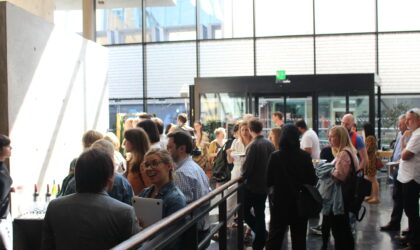
Beginner Read Audience Data Collection and Evaluation
Audience research is the process of gathering information about the people who visit you or see your work, use your services, or engage with your organisation.
Attachments:
Download: Introduction to ticketing for museums and galleries - 08.07.20_0 (1) (1520Kb)
In this article
With recent government guidelines coming into place, many organisations will be able to once again reopen their doors to the public. Within these guidelines the government have detailed a number of stringent measures that will ensure the health and safety of both its workforce and visitors, one of which being that organisations must stick to social distancing measures at all times. By using a ticketing or booking system you will be able to set pre-defined capacity numbers for your venue and ensure the even flow of visitors throughout the day. It also provides you with key infrastructure to collect visitor data in order to support the NHS Test and Trace programme. However, for organisations that usually offer free entrance or a voluntary donation scheme, implementing a new booking system will be uncharted territory.
Here at the Digital Culture Network, we have highlighted the core elements you should be considering when implementing a timed entry booking system into your organisation.
This should always be your first step when procuring any new bit of tech for your organisation and will help you to identify what sort of functionality you would require from a new system. When introducing timed ticketing, you might want to consider the following requirements:
From any initial research you may have already undertaken, you will see there are a variety of different systems on the market all offering varying functionality at varying cost. Finding the system that meets your functionality requirements and budget is vital, so it is important you explore a wide spectrum of systems to ensure you select the right product for you.
You can refer to the full guide linked at the bottom of this page for a selection and comparison of free systems you might want to consider.
Allowing your visitors to pre-book their entry to your venue will be key in making this new operation work for you. By doing this you will free up staff time from collecting data at your points of entry and also keep your visitors safe by staggering their arrival times at the venue. For many organisations, especially during the current circumstances, there will be no budget set aside for core developments to your website or indeed you may not even much control over its functionality.
The majority of ticketing systems will have a range of integration types to accommodate many different types of websites, this can be as simple as copying a unique ticketing website address onto a ‘Book Now’ button on your site. Check out some sector examples where this has been achieved:

As you may have experienced in the past when operating advanced ticketing for free events or attractions, you will most likely encounter a drop off in attendance from some of your bookers. This situation may leave you with a fully booked time slot but having to potentially deny other visitors their admittance on the occasion the original bookers turn up.
Whilst this behaviour is not completely avoidable there are a number of tactics you can use to avoid it as best you can:
Ensuring the safety and comfort of visitors with specific access requirements should be a priority in managing your capacity for each time slot. As an inclusive organisation you should be making clear, reasonable adjustments to ensure that all visitors can easily register for tickets and gain access to your venue.
It would be advisable that you set aside a number of accessibility and personal assistant tickets with each of your time slots and allow these to be booked online. You should speak with your ticketing system provider to discuss the best options for implementing this on your website and whilst minimising any potential misuse.
Managing a timed entry ticketing system will have some connotations to your overall operation and potentially create a whole new way of working for your team to get used to. For some teams who are predominantly part time or volunteer led, implementing new technology can be a large hurdle to overcome.
Try to give your team as much lead time to the implementation process as you can as surprising your team with brand new kit on the day of its use can be very daunting. Try to avoid ‘on the job’ rushed training sessions and make it as interactive and contextual as you possibly can. You could also consider creating Digital Champions within your organisation who have a natural affinity for using the software and task them with spreading positivity and knowledge of the system to others.
In the latest Government Guidelines issued on July 2nd 2020, the government have laid out the vital data you will need to collect for all persons that visit your venue. On the occasion that a member of the public tests positive for Covid-19 and has stated that they have visited your premises recently, you will need to be able to provide the details of the visitors who may have come into contact with them during that time.
If you are introducing timed ticketing to your venue, the data that you would usually collect as part of the booking process covers the basic required data set out by the government. This means you shouldn’t need to implement any additional operational structure on top of your timed entry ticketing in order to comply with Test & Trace regulations.
To read and download the full Introduction to ticketing for museums and galleries guide click here.
The Digital Culture Network is here to support you and your organisation. Our Tech Champions can provide free 1-2-1 support to all arts and cultural organisations who are in receipt of, or eligible for, Arts Council England funding. If you need help or would like to chat with us about any of the advice we have covered above, please get in touch. Sign up to our newsletter below and follow us on Twitter @ace_dcn for the latest updates.
Original article created in 2020. Author: Nick Kime.
Beginner Read Audience Data Collection and Evaluation
Audience research is the process of gathering information about the people who visit you or see your work, use your services, or engage with your organisation.
Beginner Read Digital Accessibility
The goal of digital accessibility is to create digital products and services that are inclusive and provide equal access to information and functionality to all users, regardless of their abilities. This article aims to introduce you to the principles of digital accessibility, and shed some light on some of the things you need to know when creating accessible digital content.
Beginner Read Digital Strategy
An effective digital strategy can be vital to your organisation’s success. Read on to understand the key considerations when developing yours.
Beginner Read Email Marketing
Email marketing is a powerful tool when it comes to building relationships with your audience. Read on to find out more about what it can do for your organisation.
Beginner Read Box Office and Ticketing Customer Relationship Management CRM
Understanding your audience data can be your ticket to success. Read on to find out how to make the most of what your customers tell you.
Beginner Read Social Media
Social media is a unique and powerful way to help your organisation thrive and engage with your audience. Read on to find out more.




